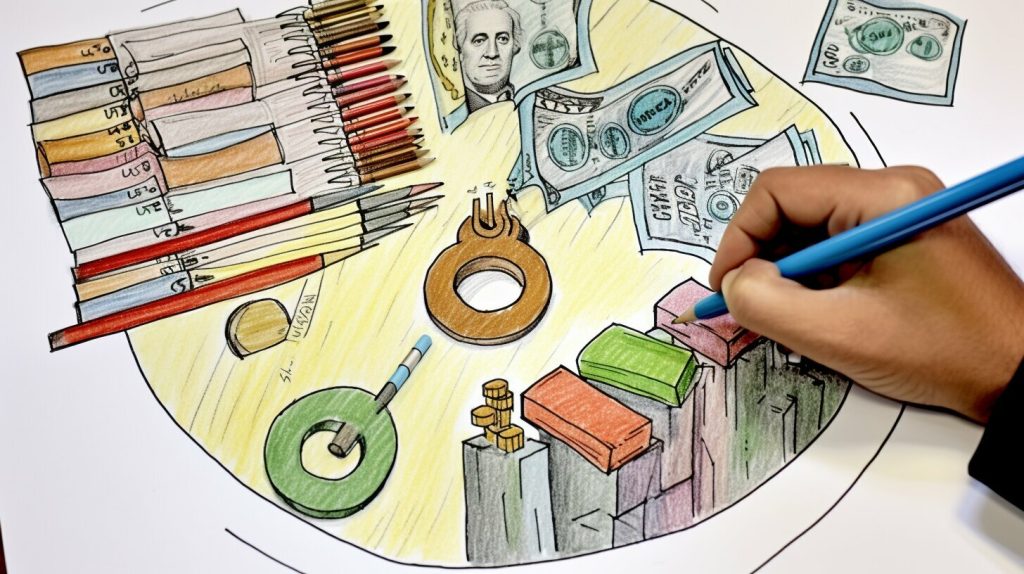Welcome to this article where we’ll delve into the world of financial literacy. With the constantly changing financial landscape, it’s essential to understand the importance of financial literacy and the skills required to be financially savvy. In this section, we’ll explore the concept of financial literacy and determine whether it’s considered a hard skill. Let’s get started!
Key Takeaways:
- Financial literacy is vital in today’s world.
- Understanding its importance and required skills is crucial.
- Let’s explore whether financial literacy is a hard skill.
Understanding Financial Literacy
Financial literacy is a broad concept that encompasses a range of skills and knowledge related to managing personal finances. It involves understanding the basics of budgeting, saving, investing, and managing debt, as well as more complex financial concepts like retirement planning and tax management.
To be financially literate, you need to be able to apply these skills and knowledge to your own financial situation, making informed decisions about spending, saving, and investing that align with your personal goals and values.
Financial Literacy Skills
The skills required for financial literacy can be broken down into two main categories: quantitative and qualitative. Quantitative skills involve the ability to work with numbers and financial data, while qualitative skills involve more subjective factors like attitudes, beliefs, and values related to money.
Some key quantitative financial literacy skills include:
- Basic math skills, including the ability to perform simple calculations like addition, subtraction, multiplication, and division
- Understanding financial statements, including income statements, balance sheets, and cash flow statements
- Knowledge of financial products and services, such as savings accounts, credit cards, loans, and investment vehicles like stocks and mutual funds
Qualitative financial literacy skills include:
- Self-awareness and emotional intelligence, particularly in relation to money and personal finance
- Critical thinking and problem-solving skills, enabling you to make informed decisions about your finances
- Effective communication skills, allowing you to effectively negotiate financial decisions with others, such as a spouse or financial advisor
Teaching Financial Literacy
Financial literacy is a skill that can be taught, and educational institutions have an important role to play in promoting financial literacy among young people. However, there is currently no standardized financial literacy curriculum in the United States, and many teachers lack the necessary training and knowledge to effectively teach financial literacy.
To effectively teach financial literacy, educators need to incorporate both quantitative and qualitative skills and use a range of teaching strategies to engage diverse learners. This might include using real-life examples and case studies, incorporating technology and multimedia resources, and providing opportunities for hands-on learning and experimentation.
Despite the challenges involved in teaching financial literacy, it is a crucial skill that can have a significant impact on individuals’ lives and society as a whole. By promoting financial literacy education and supporting effective teaching strategies, we can help ensure that everyone has the skills and knowledge they need to make informed financial decisions and achieve their financial goals.
The Importance of Financial Literacy
In today’s fast-paced world, financial literacy is an essential skill that can empower you to make informed decisions about your money. Whether you’re saving for a house, investing in the stock market, or trying to stay out of debt, having a solid understanding of financial concepts is crucial to achieving your financial goals.
Financial literacy skills can help you create a budget, manage your debt, and grow your wealth. By developing these skills, you can gain greater control over your financial future and avoid common financial mistakes that can be costly in the long run.
Improving your financial literacy can also benefit your mental health and overall well-being. Money is a major source of stress for many people, and by learning to manage your finances more effectively, you can reduce the stress and anxiety associated with financial problems.
Ultimately, the importance of financial literacy cannot be overstated. By arming yourself with knowledge and skills, you can take charge of your financial future and achieve greater financial security and independence.

Is Financial Literacy a Hard Skill?
Financial literacy is often touted as a crucial skill for individuals to possess, but is it considered a hard skill? There is no straightforward answer to this question as it largely depends on how financial literacy is defined.
Some argue that financial literacy encompasses concrete skills such as budgeting, investing, and saving, which would classify it as a hard skill. Others contend that financial literacy involves a broader understanding of financial concepts and decision-making, which would classify it as a soft skill.
Regardless of the classification, it is clear that possessing financial literacy is essential in today’s world. With the rise of consumer debt and the complexity of financial products, individuals must be equipped with the knowledge to make informed decisions.

Without financial literacy, individuals may fall victim to common financial pitfalls, such as overspending, taking on too much debt, or not saving enough for retirement. Additionally, being financially literate can lead to greater financial stability and independence.
Therefore, whether financial literacy is considered a hard or soft skill, it is undeniable that it is a crucial skill to possess. By educating yourself and improving your financial literacy, you can take control of your financial future and make informed decisions.
Improving Financial Literacy
To improve your financial literacy, there are several steps you can take:
- Create a budget: Developing a budget can help you track your spending habits and identify areas where you can cut back. There are several online resources and mobile apps available to help you create a budget.
- Learn about saving and investing: Understanding how to save and invest your money can help you achieve your financial goals. There are many online resources and books available to help you learn about these topics.
- Take advantage of financial literacy programs: Many organizations offer financial literacy programs, such as workshops and seminars, to help individuals improve their financial skills. Check with your employer or local community center to see if they offer any programs.
By taking these steps, you can improve your financial literacy and make more informed financial decisions.
“Financial peace isn’t the acquisition of stuff. It’s learning to live on less than you make, so you can give money back and have money to invest. You can’t win until you do this.” – Dave Ramsey
The Challenges of Teaching Financial Literacy
Teaching financial literacy poses several challenges, particularly due to the lack of standardized curriculum and varying levels of financial knowledge among educators. As a result, students may receive inconsistent or inadequate financial education.
The lack of standardized curriculum means that financial literacy education varies widely across different schools and educational institutions. Some schools may offer comprehensive financial literacy programs, while others may provide only basic financial education. This inconsistency can result in gaps in financial knowledge and skills among different student populations.
Furthermore, many educators lack the necessary expertise to teach financial literacy effectively. A survey conducted by the National Endowment for Financial Education found that only 24% of K-12 teachers feel confident teaching personal finance topics. This lack of confidence and knowledge can lead to inadequate financial education for students, as well as contribute to the perpetuation of financial illiteracy.
The Importance of a Standardized Curriculum
One potential solution to the challenges of teaching financial literacy is the implementation of a standardized curriculum. A standardized curriculum would ensure that all students receive consistent and comprehensive financial education. States like Florida and Texas have already implemented such a curriculum.
However, the implementation of a standardized curriculum can also pose challenges. It can be difficult to develop a curriculum that is both comprehensive and engaging for students. Educators may also require additional training in order to effectively teach the curriculum.
Addressing the Educator Knowledge Gap
To overcome the lack of expertise among educators in teaching financial literacy, it’s important to provide them with relevant training and resources. This can be achieved through professional development programs and online courses. Financial literacy organizations, such as the Jump$tart Coalition, offer resources and training for educators to improve their financial literacy instruction.
Collaboration between financial experts and educators can also be beneficial in improving financial literacy education. Financial experts can provide insights on financial topics and help educators develop engaging lesson plans.
Overall, addressing the challenges of teaching financial literacy requires collaboration and effort from both educators and financial experts. With a standardized curriculum and improved educator training, students can receive consistent and comprehensive financial education, and be better equipped to make informed financial decisions.

Incorporating Financial Literacy into Everyday Life
If you want to improve your financial literacy, it’s important to incorporate financial skills into your daily routine. By making small changes to your spending habits and budgeting, you can quickly start building a solid foundation of financial knowledge.
1. Create a Budget
One of the simplest ways to improve your financial literacy is to start creating and following a budget. A budget is a plan that outlines how you will spend your money each month, including your income and expenses. By sticking to a budget, you can gain a better understanding of your spending habits and identify areas where you can cut back.
If you’re not sure where to start, there are many free budgeting tools available online such as Mint or Personal Capital that can help you create a budget and track your expenses.
2. Start Saving
Saving money regularly is another important step towards improving your financial literacy. Set a savings goal for yourself and make a plan to reach that goal each month. This can be as simple as putting a portion of your paycheck into a savings account or setting up automatic transfers from your checking account to a savings account.
Remember, it’s important to have an emergency fund in case of unexpected expenses. Aim to have at least 3-6 months’ worth of expenses saved in an easily accessible account.
3. Invest in Your Future
Investing can be a great way to grow your wealth over time, but it’s important to do so wisely. Do your research and consider speaking with a financial advisor before making any major investment decisions.
If you’re just starting out, consider investing in a low-cost index fund or a robo-advisor that will automatically invest your money into a diversified portfolio.
By incorporating these financial literacy skills into your everyday life, you can begin to make more informed financial decisions and work towards a more secure financial future.
The Role of Technology in Financial Literacy
Technology has revolutionized the way we learn and access information, and financial literacy is no exception. With the rise of online resources and mobile apps, it has become easier than ever to improve your financial knowledge and skills.
One way technology has improved financial literacy is through the availability of financial literacy programs online. These programs offer interactive courses and workshops that can help you learn about financial concepts and strategies at your own pace. Plus, many of these programs are free and accessible to anyone with an internet connection.
Mobile apps are also a useful tool for improving your financial literacy. There are several apps available that can help you budget, track your expenses, and even invest in the stock market. By using these apps, you can develop good financial habits and make informed financial decisions.
Another advantage of technology is the ability to access financial information and news in real-time. With the click of a button, you can stay up-to-date on market trends, investment opportunities, and economic news. This can help you make timely and well-informed financial decisions.
Furthermore, technology has made financial education more accessible to individuals who may not have access to traditional financial education resources. For example, people in rural areas or developing countries may not have easy access to financial education resources, but with technology, they can access financial literacy programs and resources online.
Overall, technology has played a significant role in improving financial literacy and making financial education more accessible. By taking advantage of the resources available online and through mobile apps, you can improve your financial literacy and make informed financial decisions.

Future Outlook for Financial Literacy
As we move towards a more digitally-driven financial landscape, the importance of financial literacy is only likely to increase. With emerging technologies and innovative financial solutions, individuals need to equip themselves with the necessary skills and knowledge to navigate this changing landscape.
One potential area of focus for the future of financial literacy is early education. By incorporating financial literacy into academic curriculums at an early age, individuals can develop a strong foundation for making informed financial decisions later on in life. This includes not only traditional educational institutions but also community programs and extracurricular activities.
Another aspect that is likely to grow in importance is the use of technology in promoting financial literacy. With the rise of online resources and mobile apps, individuals have access to a wealth of information and tools to enhance their financial knowledge and skills. Additionally, financial literacy programs that leverage technology to increase accessibility are likely to become more prevalent in the future.
Overall, the future outlook for financial literacy is promising. As individuals become more aware of the importance of financial literacy and adopt a proactive approach towards improving their financial knowledge, we can expect to see a greater level of financial empowerment and security across the board.

Conclusion
Congratulations, you have reached the end of this article! Hopefully, you now have a better understanding of financial literacy and why it is so important in today’s world. Remember, financial literacy is not just a hard skill, but a valuable life skill that can empower you to make informed decisions and achieve financial stability.
We discussed the different components of financial literacy and ways in which you can improve your own financial literacy skills. We also looked at the challenges of teaching financial literacy and how technology can play a role in promoting financial education.
It’s never too late to start learning about personal finance and incorporating financial literacy into your daily life. Remember to take advantage of educational resources and seek out guidance from financial professionals if needed.
Take Action Now
Don’t wait any longer to start improving your financial literacy. Start by setting financial goals for yourself and creating a budget to help you achieve those goals. Consider attending financial literacy programs or workshops, and explore online resources and mobile apps that can assist you in building your financial knowledge. With dedication and perseverance, you can attain financial literacy and take control of your financial future.
FAQ
Q: Is financial literacy a hard skill?
A: Financial literacy is not considered a hard skill. It is more of a fundamental knowledge and understanding of financial concepts and practices that can be learned and developed over time.
Q: What is financial literacy?
A: Financial literacy refers to the ability to understand and use various financial skills, including personal financial management, budgeting, investing, and understanding financial institutions and products.
Q: Why is financial literacy important?
A: Financial literacy is important because it empowers individuals to make informed financial decisions, avoid debt, build wealth, and achieve financial security and independence.
Q: How can I improve my financial literacy?
A: You can improve your financial literacy by actively seeking out financial education resources, attending workshops or courses, reading personal finance books, and practicing good financial habits such as budgeting and tracking expenses.
Q: What are the challenges of teaching financial literacy?
A: Some challenges of teaching financial literacy include the lack of standardized curriculum, varying levels of financial knowledge among educators, and the need for ongoing training and resources.
Q: How can I incorporate financial literacy into my everyday life?
A: You can incorporate financial literacy into your everyday life by practicing good money management habits, such as budgeting, saving, tracking expenses, and making informed financial decisions.
Q: What is the role of technology in financial literacy?
A: Technology plays a significant role in enhancing financial literacy through online resources, mobile apps, and digital platforms that provide access to financial information, tools, and educational content.
Q: What is the future outlook for financial literacy?
A: The future outlook for financial literacy is promising, as the importance of financial education is becoming increasingly recognized. Early financial education is seen as beneficial, and advancements in technology are expected to further improve accessibility to financial literacy resources.
Recent Posts
How to Make Money Online for Beginners Without Paying Anything
If you're new to the world of online income, you may be wondering if it's possible to earn money without spending any money upfront. The good news is that there are many free methods you can use to...
Affiliate marketing is a fantastic avenue to generate passive income online. By becoming an affiliate marketer, you can earn commissions by promoting other people’s products or services. In this...

